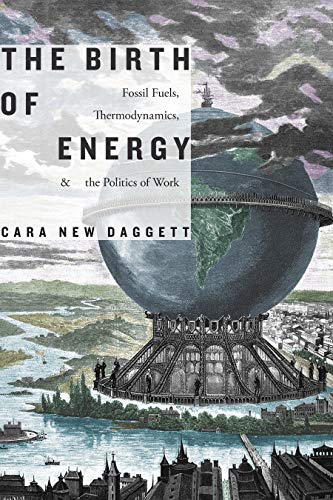In The Birth of Energy Cara New Daggett traces the genealogy of contemporary notions of energy back to the nineteenth-century science of thermodynamics to challenge the underlying logic that informs today's uses of energy. These early resource-based concepts of power first emerged during the Industrial Revolution and were tightly bound to Western capitalist domination and the politics of industrialized work. As Daggett shows, thermodynamics was deployed as an imperial science to govern fossil fuel use, labor, and colonial expansion, in part through a hierarchical ordering of humans and nonhumans. By systematically excavating the historical connection between energy and work, Daggett argues that only by transforming the politics of work—most notably, the veneration of waged work—will we be able to confront the Anthropocene's energy problem. Substituting one source of energy for another will not ensure a habitable planet; rather, the concepts of energy and work themselves must be decoupled.
چکیده فارسی
در تولد انرژی کارا نیو داگت تبارشناسی مفاهیم معاصر انرژی را به علم ترمودینامیک قرن نوزدهمی ردیابی میکند تا منطق زیربنایی را که کاربردهای امروزی انرژی را بیان میکند، به چالش بکشد. این مفاهیم اولیه قدرت مبتنی بر منابع برای اولین بار در طول انقلاب صنعتی ظهور کرد و به شدت به سلطه سرمایه داری غرب و سیاست کار صنعتی وابسته بود. همانطور که داگت نشان می دهد، ترمودینامیک به عنوان یک علم امپراتوری برای کنترل استفاده از سوخت فسیلی، نیروی کار، و گسترش استعماری، تا حدی از طریق نظم دهی سلسله مراتبی انسان ها و غیرانسان ها به کار گرفته شد. داگت با کاوش سیستماتیک ارتباط تاریخی بین انرژی و کار استدلال میکند که تنها با دگرگون کردن سیاست کار - به ویژه احترام به کار مزدی - قادر خواهیم بود با مشکل انرژی آنتروپوسن مقابله کنیم. جایگزینی یک منبع انرژی با منبع دیگر، سیاره قابل سکونت را تضمین نمی کند. بلکه خود مفاهیم انرژی و کار باید جدا شوند.
ادامه ...
بستن ...










